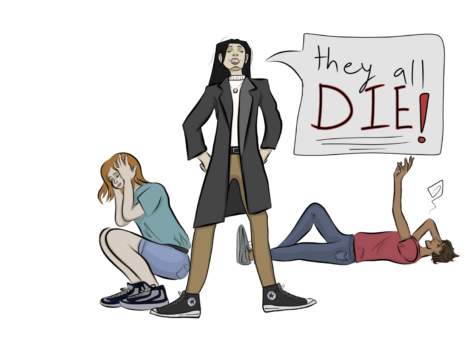Spoilers are great
February 10, 2023

Spoiler alert: I absolutely love spoilers. Whether it be for movies, books, or television shows, I love being able to know what is happening beforehand. Knowing a crucial part of the story or a plot twist helps me see the storyline as a whole from a different perspective. I understand that many people say that they wish they could read or watch something for the first time again, but imagine if you never got the chance to enjoy it in the first place? With the variety of media now, our attention spans have gotten much, much shorter; therefore, I’ve seen a lot of people drop amazing series, just because they haven’t gotten to the good part yet. But if you knew some interesting components beforehand, like a plot twist or a significant development, maybe you would continue to see how the plot progressed to that point. Your favorite part might be yet to come.
Let me give you an example (note the spoiler alert ahead). When the TV show Wednesday Addams first came out, I started watching it, but dropped it after becoming bored. It wasn’t until I saw a scene from the show on TikTok, which revealed that one of the characters, who had not been one of the main suspects, turned out to be the villain of the show. This twist made me want to pick up the series again and allowed me to be motivated to continue the show until that plot twist and eventually, the end. I would have missed out on an enjoyable storyline if it weren’t for that spoiler.
You might think spoilers take out the fun of the ending or figuring the concept along the way, but for me, they don’t. I believe they actually help to analyze the clues and hints that the authors deliberately put in along the way to provide consumers with a unique lens to view the story. As you watch it build up, you can start to put together the pieces that have been placed and by the ending, you are amazed how the show or book got from point A to B.
I may have not completely changed your perspective, but I hope I have convinced you that spoilers are not as bad as you think they are. So don’t freak out the next time you get spoiled. So much of the media we consume, after all, is not so much about the destination but the journey getting there. Why not appreciate a sneak peek of the terrain?



V0X • Jan 31, 2024 at 10:16 pm
spoil
/spoil/
Verb
diminish or destroy the value or quality of.
I figure that the issue of today’s shortening attention spans probably warrants an entire separate discussion, but that’s not what I’m focusing on here.
To preface, I’d be remiss if I painted myself as the greatest anti-spoiler crusader. I’m not some Shaolin monk. I’ve Wikipedia’d the endings of movies in the midst of watching them, clicked on the obfuscated words in Goodreads reviews, and have generally spoiled myself out of a fair share of content. And without fail, I’ve regretted it each and every time.
It’s not that I have a problem with you (or anyone else for that matter) enjoying, or at least appreciating, spoilers (although I am quite baffled). For me, to spoil or not to spoil is a fundamental question of who has control over your enjoyment of a piece of media: you or the author.
By choosing to spoil yourself, you hand your agency to the author. By choosing to bathe prematurely in the light at the tunnel’s end, you forfeit your own ability to explore. Every move a character makes, every word a character speaks, any event that unfolds, is now indubitably framed under the context of the ending. By choosing to spoil yourself, you box yourself into a frame. Instead of freeing yourself to enjoy the show in your own way, you are left with trying to order all of these individual episodes into predetermined slots.
You mention analysis, and how spoilers contribute to an understanding of a creator’s intention or message. But spoiling necessarily inhibits analysis. Maybe I’m gatekeeping analysis (which I probably shouldn’t, as someone who’s rather incompetent at it), but analysis to me has always been an act of critical thinking, one in which you take in every little (possibly irrelevant detail), and mold them together into a cohesive picture of their own right. Spoiling is cheating the process. Instead of supporting analysis as a living, growing, evolving exercise, spoiling is the functional equivalent of turning a short answer question into a fill in the blank, or solving a math problem backwards after you know the answer. Where’s the intrigue when the path is already laid out for you?
All this media may not necessarily be about the destination, but in my mind, taking a premature peek surely sullies the journey taken to reach it.
PS: Try watching The Prestige (without spoilers !)